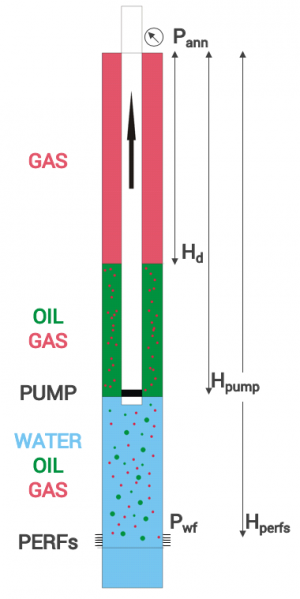Difference between revisions of "BHP from the fluid level"
From wiki.pengtools.com
(→Bottom hole pressure from the fluid level) |
(→Flowing well fluids segregation) |
||
| (20 intermediate revisions by the same user not shown) | |||
| Line 1: | Line 1: | ||
| + | __TOC__ | ||
==Bottom hole pressure from the fluid level== | ==Bottom hole pressure from the fluid level== | ||
| − | [[File:BHP from the fluid level.png|thumb|right| | + | [[File:BHP from the fluid level.png|thumb|right|300px|BHP from the fluid level notations]] |
Fluid level is the interface between the gas and liquid phases occurred in the annulus of the well. | Fluid level is the interface between the gas and liquid phases occurred in the annulus of the well. | ||
| − | Fluid level on the well is | + | Echometer is used to measure the fluid level in the wells. |
| + | |||
| + | Fluid level is used to calculate and monitor the bottom hole pressure of the wells. | ||
| + | |||
| + | ==Math and Physics== | ||
| + | The physics is based on the principal hydrostatics law: | ||
| + | :<math>P=\frac{\rho g h}{101325}</math> | ||
| + | |||
| + | ===Flowing well fluids segregation=== | ||
| + | When the well is flowing with the pump this is how fluids segregate in the well bore: | ||
| + | *Oil, gas and water are produced through the tubing from the reservoir to the surface | ||
| + | *Gas is in the annulus from the surface to the fluid level, Hd | ||
| + | *Oil and gas are between the fluid level Hd, and the pump setting depth, Hd | ||
| + | *Water, oil and gas are between pump, Hd and the top of the perforations, Hperfs | ||
| + | *Water is in the rathole | ||
| + | |||
| + | ===Equation to calculate the BHP from the fluid level=== | ||
| + | :<math>P_{wf}=P_{ann}+\frac{(H_{perfs}-H_{pump})(SG_o(1-WCUT)+SG_w WCUT)+(H_{pump}-H_d)SG_o}{10.32}</math> | ||
| + | |||
| + | Note that for the deviated wells TVD depths should be used. | ||
| + | |||
| + | ==Nomenclature== | ||
| + | :<math>g</math> = 9.81, m/s^2 | ||
| + | :<math>h</math> = depth, m | ||
| + | :<math>H_d</math> = fluid level, m | ||
| + | :<math>H_{perfs}</math> = top of the perforations, m | ||
| + | :<math>H_{pump}</math> = pump setting depth, m | ||
| + | :<math>P</math> = pressure, atm | ||
| + | :<math>P_{ann}</math> = annulus presssure, atm | ||
| + | :<math>P_{wf}</math> = well flowing bottomhole pressure, atm | ||
| + | :<math>\rho</math> = density, kg/m^3 | ||
| + | :<math>SG_o</math> = oil specific gravity, dimensionless | ||
| + | :<math>SG_w</math> = water specific gravity, dimensionless | ||
| + | :<math>WCUT</math> = well water cut, fraction | ||
| + | |||
{{#seo: | {{#seo: | ||
Latest revision as of 12:08, 27 April 2020
Contents
Bottom hole pressure from the fluid level
Fluid level is the interface between the gas and liquid phases occurred in the annulus of the well.
Echometer is used to measure the fluid level in the wells.
Fluid level is used to calculate and monitor the bottom hole pressure of the wells.
Math and Physics
The physics is based on the principal hydrostatics law:
Flowing well fluids segregation
When the well is flowing with the pump this is how fluids segregate in the well bore:
- Oil, gas and water are produced through the tubing from the reservoir to the surface
- Gas is in the annulus from the surface to the fluid level, Hd
- Oil and gas are between the fluid level Hd, and the pump setting depth, Hd
- Water, oil and gas are between pump, Hd and the top of the perforations, Hperfs
- Water is in the rathole
Equation to calculate the BHP from the fluid level
Note that for the deviated wells TVD depths should be used.
Nomenclature
 = 9.81, m/s^2
= 9.81, m/s^2 = depth, m
= depth, m = fluid level, m
= fluid level, m = top of the perforations, m
= top of the perforations, m = pump setting depth, m
= pump setting depth, m = pressure, atm
= pressure, atm = annulus presssure, atm
= annulus presssure, atm = well flowing bottomhole pressure, atm
= well flowing bottomhole pressure, atm = density, kg/m^3
= density, kg/m^3 = oil specific gravity, dimensionless
= oil specific gravity, dimensionless = water specific gravity, dimensionless
= water specific gravity, dimensionless = well water cut, fraction
= well water cut, fraction



